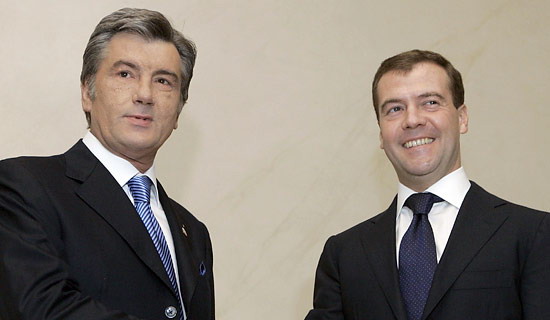
Time to De-Mothball the Budapest Memorandum for Ukraine
Publication: Eurasia Daily Monitor Volume: 6 Issue: 174
By:

A representative group of Ukraine’s cultural elite has alerted Western governments and public opinion to Russia’s mounting threats against Ukrainian independence. Alarmed by Moscow’s latest moves, the signatories of the appeal are also concerned by the failure of Western governments to respond by using existing mechanisms. The appeal, published in the Ukrainian media (UNIAN, Kyiv Post, September 10, 11), has also passed unnoticed by Western media and the governments to which it is addressed.
The signatories include some 30 senior scientists, scholars, and artists. Most of them are the heads of research institutes and university departments in fields ranging from mathematics, physics, biology and medical sciences to economics and the social sciences. The document proposes reactivating the 1994 Budapest Memorandum (signed under OSCE aegis) on guarantees to Ukraine’s security.
The document notes that Ukraine’s independence was central to ending the East-West conflict in Europe and remains a guarantee against its resumption. Recently, however, "the Russian government has embarked on a calculated policy to dismantle the existing system of international security: "As part of this policy, the Russian leadership seeks "to force Ukraine to serve Russia’s geopolitical interests" (UNIAN, Kyiv Post, September 10, 11).
Ukrainians are particularly concerned about Russian President Dmitry Medvedev’s latest initiatives, two of which are singled out in the intelligentsia’s appeal. One is the amending of Russia’s Law on Defense to create a wide range of possibilities for Russia unilaterally to use military force beyond its borders, at short notice, and at the president’s full discretion. The Russian Duma adopted these amendments on September 9, creating a wide range of potential casus belli situations that Russia reserves the right unilaterally to invoke. This initiative is meant to operationalize Medvedev’s own ideas about military intervention, enunciated by him after the invasion in Georgia and dubbed as the "Medvedev doctrine." It justifies the use of military force to protect the "rights and dignity" [undefined] of Russian citizens and "Russian-speakers" in other countries. This excuse can find a wider scope for application in Ukraine than in any other country.
Medvedev’s other recent move was his prosecutorial letter, addressed formally to the Ukrainian President Viktor Yushchenko, but directed in fact at the entire body politic in the run-up to the Ukrainian presidential election. The letter sets markers and red lines with regard to Ukrainian foreign policy and its internal national development in accordance with Russian strategies. Medvedev’s open letter (Interfax-Ukraine, August 11, 12), which continues to be discussed in Ukraine in the pre-electoral context, presumes to veto Ukraine’s future integration into NATO; asserts a droit de regard over Ukraine’s international relationships; seeks explicitly to criminalize Ukrainian-Georgian military cooperation; accuses Ukraine of deviating from the 1997 bilateral treaty (a veiled threat to rescind Russia’s recognition of Ukraine’s territorial integrity under that treaty); implies that Ukraine’s gas transit system should be part of a unified one with Russia; denounces (against all evidence) the "ousting of the Russian language" from Ukraine’s public life; and demands bringing Ukrainian historiography into line with an officially backed Russian view of historical events. Medvedev demands policy changes across the board in accordance with Ukrainian-Russian "brotherhood."
The intelligentsia’s representatives noted in their document that Moscow misunderstands Ukrainian aspirations. Ukraine’s western-oriented policy is not directed against Russia, but serves Ukrainian interests. Russian policy, however, aims to "turn Ukraine into a zone of Russian direct influence and control." In that event, "subordination of Ukraine to Russia’s strategic objectives can bring back the division of Europe. It could directly threaten the security of European Union member countries." In this regard, Moscow’s recent steps signify an escalation, "a new phase in the attitude of Russia’s power-center toward Ukraine" (UNIAN, Kyiv Post, September 10, 11).
The Ukrainian signatories observed that the existing security framework can no longer reliably protect Ukraine’s sovereignty against pressure and intrusion from outside. The document appeals to E.U. governments and institutions "to take a clear and unambiguous stand regarding Ukraine’s sovereignty; to restrain Russia from intruding into Ukraine’s internal affairs."
Invoking the 1994 Budapest Memorandum, they also noted that the security guarantees contained therein have diminished in their effectiveness, but remain useful and need reaffirmation. Under that memorandum (signed during the OSCE’s summit that year), the nuclear powers extended security guarantees to Ukraine after the latter had completely renounced its arsenal of nuclear weapons. The intelligentsia representatives are appealing to the U.S., British, French, and Chinese governments to call a conference of the five nuclear powers -including Russia- with the aim of reaffirming the security guarantees as stipulated by the Budapest Memorandum. Those guarantees cover Ukraine’s territorial integrity, the inviolability of its borders in accordance with the OSCE’s Helsinki Final Act, and protection against other forms of external coercion on Ukraine.
Given the growing uncertainties surrounding NATO and U.S. policies in Eastern Europe, where Moscow is moving into a perceived grey zone, a reaffirmation of the Budapest Memorandum would make sense at least as a stop-gap measure. Although the implementing mechanism may be subject to each signatory power’s consent -or a Russian veto- discussion of this issue at an appropriately high international level could focus much needed attention on this major security issue in Eastern Europe. Beyond Ukraine itself, such a step could also positively affect the security environment in the Black Sea region.
The Budapest Memorandum retains its validity continuously since 1994. Its de-mothballing could also help limit the intrusion of Russia’s strategic agenda into Ukraine’s presidential election campaign. Such intrusion demonstrated its explosive potential in Ukraine’s 2004 presidential election. The security environment around Ukraine has since deteriorated markedly, and at an accelerating rate in recent months. The OSCE’s upcoming year-end meeting would be the right venue for a reaffirmation of the Budapest Memorandum, 15 years after the same organization affirmed its support for the memorandum’s signing.




